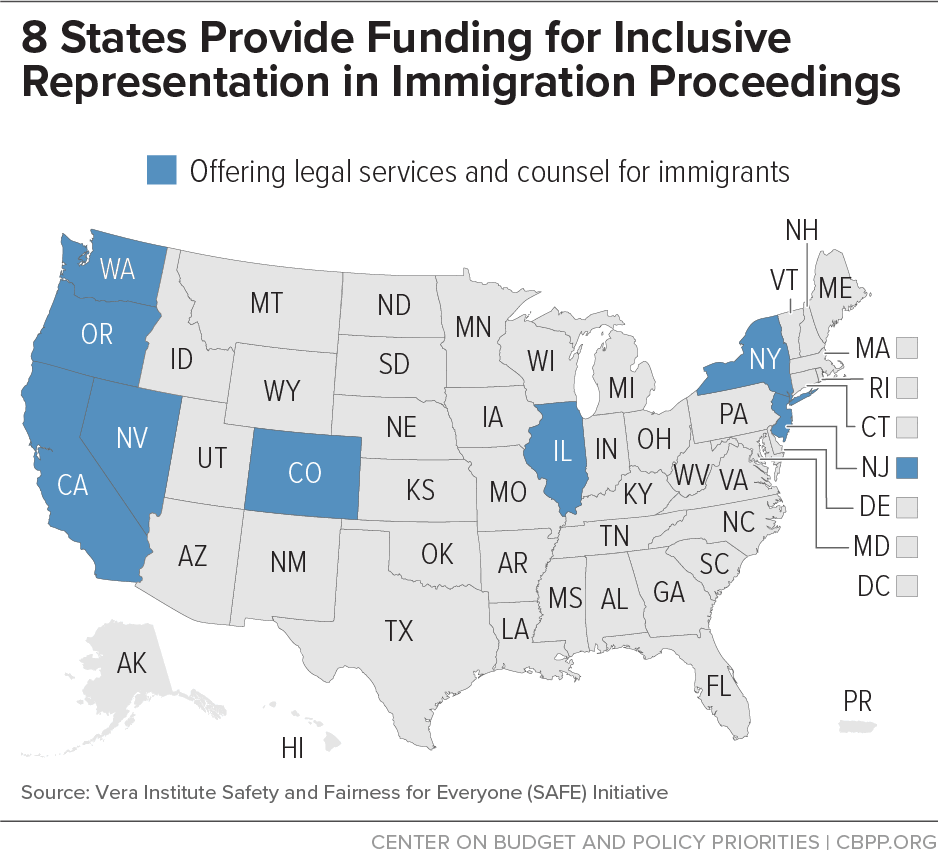BEYOND THE NUMBERS
A number of states are considering adopting policies to expand immigrants’ rights and opportunities to thrive, building on the many steps forward in 2021. Immigrants play a critical role in local and state economies and contribute in myriad ways to the health and well-being of communities across the country. While what immigrants without a documented status most need is federal legislation creating a pathway to citizenship, states can take important steps to be more inclusive and fair to immigrants and their families. By adopting policies that create paths to prosperity — in areas such as college tuition, driver’s licenses, and access to health care — states can dismantle systemic barriers for people without a documented immigration status and allow them more opportunity to contribute to their states, communities, and economies.
Immigrant-inclusive policies enacted in 2021 include:
- Higher education. Arizona lawmakers passed a measure that, if voters approve it this fall, will allow students who don’t have a documented status to pay in-state tuition rates at public universities and community colleges. At least 21 states and the District of Columbia have extended in-state tuition to students who are undocumented, which encourages enrollment and retention. Equal access to state financial aid, which 13 states and D.C. now provide, is also beneficial, as it reduces a financial barrier to enrollment and completion.
- Driver’s licenses. Virginia lawmakers, who acted in 2020 to allow people who are undocumented to receive a driver privilege card (similar to a driver’s license), enacted a law in 2021 to protect drivers’ private information from being used for immigration enforcement. Virginia also expanded access to state-issued identification cards with no immigration-status-related requirement. Equal access to driver’s licenses allows people to travel for daily needs, such as getting to their jobs, and increases road safety because earning a license requires training, testing, and removes a key barrier to auto insurance. Currently, 16 states, the District of Columbia, and Puerto Rico allow residents to get driver’s licenses regardless of immigration status.
- Workers’ rights and wage protections. Colorado and Pennsylvania passed safety standards and protections for immigrant workers, such as preventing unfair labor practices. Ensuring that individuals receive fair pay and work under humane conditions allows immigrants — many of whom have worked on the front lines during the pandemic — to thrive.
- Health care. Connecticut extended state-funded full Medicaid coverage to pregnant women and children from households with low incomes regardless of immigration status. California and Illinois built on previous state-funded Medicaid expansions by extending coverage to seniors with low incomes without imposing an immigration-related eligibility requirement. COVID-19 has disproportionately affected communities of color and people who are marginalized, due in part to systemic racism; inclusive coverage can promote health equity for immigrants and improve long-term health and economic opportunities.
- Professional licenses. Arkansas, Colorado, and New Mexico passed laws to remove immigration-related barriers to obtaining professional licensing. The New Mexico law builds on a previous law that made a number of occupational licenses available to immigrants by explicitly eliminating remaining barriers in fields such as optometry, physical therapy, and real estate. Federal law prohibits the issuance of professional licenses to immigrants who don’t have a documented status but does allow states to pass laws making them eligible. Reducing barriers to occupational licenses increases access to professional opportunities and further allows immigrants to thrive and prosper.
- Excluded worker funds. Several states established funds for workers who lost income during the pandemic but weren’t eligible for programs such as unemployment insurance or federal COVID-19 relief programs due to their immigration status or other factors. New York’s fund, for example, provided one-time payments in 2021 of up to $15,600; the Fund Excluded Workers Coalition is calling on state policymakers to replenish the fund for 2022 to help those who applied but were denied due to insufficient funds and to create a permanent program that would provide unemployment assistance to excluded workers going forward. Many other states also created funds in 2020 or 2021, including California, Colorado, Connecticut, the District of Columbia, Illinois, Maryland, New Jersey, New Mexico, New York, North Carolina, Oregon, Vermont, Washington, and Wisconsin.
- Earned Income Tax Credits (EITCs). Maine, Maryland, New Mexico, and Oregon made their EITCs inclusive of immigrants by enabling people without a Social Security number to use an Individual Tax Identification Number (ITIN) to claim the credits. Washington State funded its Working Families Tax Credit for the first time since its creation in 2008 and expanded eligibility to ITIN filers. These five states join California and Colorado, which extended their state EITCs to include ITIN filers in 2020. These changes not only expand economic opportunity for immigrant workers paid low wages but also benefit local and state economies by helping those families keep up basic spending.
- Representation in immigration proceedings. Colorado, Nevada, and New Jersey improved legal counsel and services for immigrants. Colorado created a program, based on a model piloted by the city of Denver, to provide legal representation to immigrants facing deportation. Nevada created new programs for individuals facing detention or deportation based on their immigration status. And New Jersey increased funding for its existing program by $2 million. Publicly funded universal representation promotes fairness and helps protect immigrants’ fundamental right to counsel. (See map.)
Progress toward inclusive policies is continuing in 2022. The Massachusetts House of Representatives recently approved a bill to allow all qualified residents to apply for a driver’s license next year, regardless of documentation status. California Governor Gavin Newsom’s 2022 budget would extend health care to all people with low incomes who are undocumented. Maryland enacted a bill extending state-funded Medicaid coverage to pregnant women and infant children from households with low incomes regardless of immigration status. New York is considering providing residents with access to professional and business licenses regardless of immigration status. And the Hawai’i legislature is considering a bill that would provide legal counsel for people who are immigrants with low incomes. As in 2021, community coalitions and immigrants themselves will play an instrumental role in leading advocacy for these proposals.
With states now benefiting from temporary budget surpluses and federal aid, policymakers should use ongoing legislative sessions to build on last year’s successes, ensure a more equitable recovery from the pandemic, reverse or counteract structural racism in immigration policies, and explore new avenues to empower immigrants and their families.


